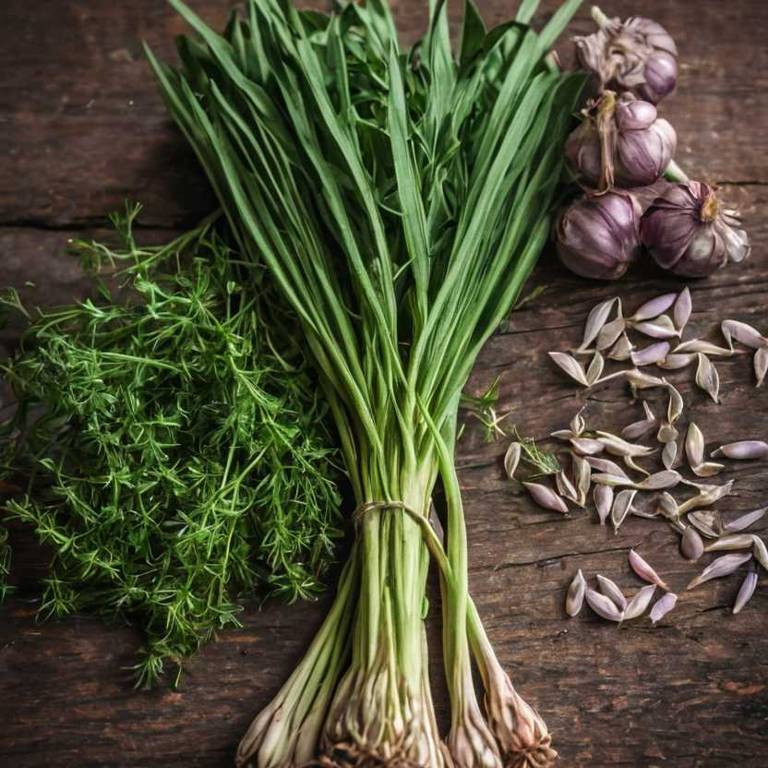Garlic (Allium sativum)
Garlic (Allium sativum) is a member of the Amaryllidaceae family, native to Central Asia, Southern Europe, and Western Asia. Traditionally, its bulbs, leaves, and flowers have been used for culinary uses, powders, and infusions.
This herb is particularly valued for its anti-inflammatory, carminative, and antispasmodic actions, and has a long history of use in european herbal medicine, mediterranean herbal traditions, and traditional chinese medicine.

Quick Facts / Key Information
| Common Name | Garlic |
|---|---|
| Scientific Name | Allium sativum |
| Plant Family | Amaryllidaceae |
| Genus | Allium |
| Species | sativum |
| Native Range | Central Asia, Southern Europe, Western Asia |
| Plant Parts Used | Bulbs, Leaves, Flowers |
| Primary Medicinal Actions | Anti-Inflammatory, Carminative, Antispasmodic |
| Primary Traditional Systems | European Herbal Medicine, Mediterranean Herbal Traditions, Traditional Chinese Medicine |
| Historical Preparation Methods | Culinary Use, Powder, Infusion |
Botanical Identity
- Scientific Name
- Allium sativum
- Common Name
- Garlic
- Synonyms / Alternative Names
- Elephant Garlic, Allium, Stem Garlic
- Plant Family
- Amaryllidaceae
- Genus
- Allium
Botanical Description
- Growth Habit
- Perennial herbaceous plant.
- Height
- It typically grows to a height of 30 to 60 centimeters.
- Leaves
- Linear leaves with upper surface glaucous and lower surface white pubescent.
- Flowers
- Small, clustered flowers with six white petals, six green sepals, and a pale yellow central stamen cluster, actinomorphic, with no distinct markings or unique floral structures.
- Stems
- Cylindrical, solid, herbaceous, with a longitudinal ridge, smooth surface, and nodes bearing membranous sheaths.
Traditional Uses / Historical Use
Traditional Systems
- European Herbal Medicine
- Mediterranean Herbal Traditions
- Traditional Chinese Medicine
- Ayurvedic Medicine
Historical Preparation Methods
- Culinary Use
- Powder
- Infusion
- Decoction
Medicinal Actions
- Anti-inflammatory
- In herbal literature, noted as a moderate anti-inflammatory, in inflammation-focused discussions.
- Carminative
- As described in traditional systems, a warming carminative, within digestive system contexts.
- Antispasmodic
- Historically regarded as a mild antispasmodic, for cramp-focused discussions.
- Tonic
- Commonly referenced as a calming tonic, in whole-system applications.
Active Compounds
- Essential Oil
- Naturally occurring plant oils composed primarily of volatile constituents.
- Terpenoid
- A diverse group of organic compounds present in many aromatic plants.
- Flavonoid
- A widely occurring class of plant polyphenols found in leaves, flowers, and fruits.
- Phenolic Acid
- A group of plant-derived compounds frequently identified in herbal material.
Modern Research Overview
Scientific literature concerning this plant spans multiple areas, including phytochemistry and laboratory research. Detailed analysis of published studies is not included at this time and will be added as part of future editorial expansion.
Safety & Contraindications
- General Precautions
- Precautionary considerations have been reported in relation to this herb.
- Contraindications
- Contraindications related to this herb have been noted in traditional use and available sources.
- Allergies
- Sensitivity or allergy-related effects have not been clearly established.
- Drug Interactions
- The potential for interactions with prescription medications has not been extensively studied.
- Toxicity
- Reports of toxicity related to this herb are not well documented in available literature.
- Pregnancy & Breastfeeding
- There is insufficient evidence to determine the safety of this herb during pregnancy or breastfeeding.
Preparation & Usage Methods
- Infusion
- Infusions are commonly prepared using hot water to release aromatic and soluble components.
- Decoction
- Plant parts are gently boiled in water to release soluble constituents.
- Poultice
- Poultices involve external application of prepared plant matter.
- Culinary Use
- Leaves, flowers, or roots are used as ingredients in culinary preparations.
- Powder
- Dried plant material is ground into a fine powder.
Growing, Harvesting & Storage
Growing / Cultivation
- Soil
- Prefers loamy soil with well-drained conditions. Typically grows best in high organic matter soils.
- Sunlight
- Thrives in full sun. Tolerates full sun to partial shade.
- Watering
- Prefers well-balanced moisture levels. Tolerates short periods of dryness.
Medical Disclaimer
The information provided on this page is for educational and informational purposes only. It is not intended to diagnose, treat, cure, or prevent any medical condition. Always consult a qualified healthcare professional before using any herb for medicinal purposes.